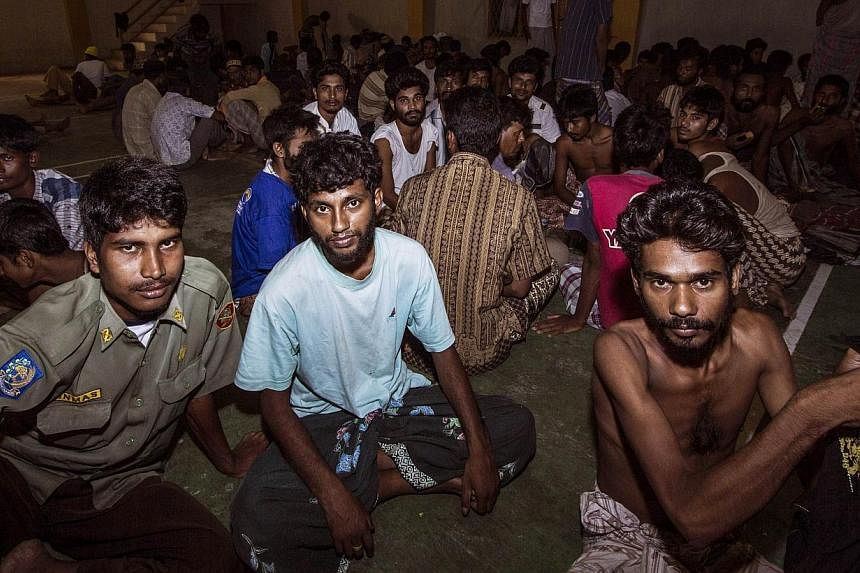LANGKAWI (AFP) - South-east Asian governments on Tuesday faced international appeals to rescue thousands of migrants believed to be stranded at sea without food and water, with warnings that many may die if action is not taken.
The escalating alarm over the region's refugee crisis came as Indonesia's navy said it had turned away a boat carrying hundreds of migrants from Myanmar and Bangladesh to an uncertain fate.
Nearly 2,000 boatpeople from Myanmar and Bangladesh have swum ashore, been rescued or intercepted off Malaysia and Indonesia in recent days after Thailand - a key stop on human smuggling routes - launched a crackdown on the trade.
The Arakan Project, a Rohingya rights group, has said as many as 8,000 people may be adrift and the International Organisation for Migration (IOM) said search and rescue operations are urgently needed.
"It needs a regional effort... we don't have the capacity to search for them, but governments do, they have boats and satellites," said Joe Lowry, a Bangkok-based spokesman for the IOM, a 157-member-state intergovernmental organisation.
He told AFP those still at sea may be in a "very bad condition or even dead" if not found soon.
Thousands of impoverished Muslim Rohingya - a minority unwanted by Myanmar's government - and Bangladeshis undertake a perilous sea and land trafficking route through Thailand and into Malaysia every year.
The recent wave of arrivals on Malaysian and Indonesian shores is believed caused by human-smugglers dumping their cargo as Thailand has moved to crush the trade after discovering dozens of migrant remains in secret jungle camps earlier this month.
But it also is feared that the crackdown may have left thousands of desperate migrants on rickety boats with no food and water as traffickers search for new routes to evade authorities.
Abandoned at sea
"It appears people are holding people captive on sea because they are afraid to disembark," said Ms Vivian Tan, spokeswoman for the United Nations High Commissioner for Refugees (UNHCR) in Bangkok.
She said some vessels may have been abandoned by smugglers.
Ms Tan said there was "definitely a need for countries in the region to come together to see how best to" deal with the situation, and that the UNHCR was willing to help.
Human smuggling has thrived for years in South-east Asia in the absence of major coordinated efforts by regional authorities to stamp it out or address its root causes.
Indonesia underlined the problem by turning away a vessel that had arrived on Monday along the coast of its north-western Aceh region with an estimated 400 migrants on board.
A day earlier, 573 men, women and children straggled ashore to Aceh from a different boat, with officials saying many were in poor health.
Indonesian navy spokesman Manahan Simorangkir told AFP that the boat with 400 aboard had been towed out of Indonesian waters.
"We gave them fuel and asked them to proceed," he said. "We are not forcing them to go to Malaysia nor Australia. That is not our business. Our business is they don't enter Indonesia because Indonesia is not the destination."
Thailand has called recently for Malaysia and Myanmar to hold a meeting to discuss the problem but there has so far been no word from regional governments on any plans to try to reach the many feared out at sea.
Mr Ali Hussein, a 31-year-old ethnic Rohingya, is among more than 1,000 people who have swum ashore on the Malaysian resort island of Langkawi.
Like thousands of his people, he left Myanmar to flee sectarian violence that has targeted Rohingya in recent years.
"I was running for my life," he said.
He and about 800 other people endured 43 days on an overcrowded vessel as already-scarce food and water supplies dwindled.
The ship had been meant to travel to Thailand, but instead diverted to the holiday island, where its weak and hungry passengers leapt into the sea in a desperate swim to safety.
"We landed here and there was no more food or water so we just jumped out of the boat," he said.
Buddhist-majority Myanmar views its population of Muslim Rohingya, estimated at more than 1.3 million, as illegal Bangladeshi immigrants. The UN considers them to be among the world's most persecuted minorities.
Many make their way down the Thai coast and overland into Muslim-majority Malaysia - a relatively prosperous magnet for migrants and refugees from surrounding nations.
Some continue on through Indonesia, seeking eventual passage to Australia, Rohingya say.

